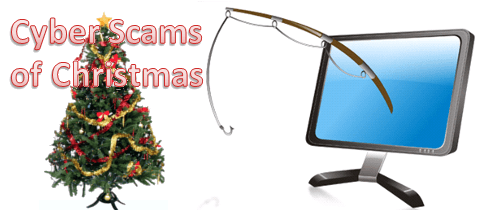 Tis the season for Cyber-Scams! and…
Tis the season for Cyber-Scams! and…
to buy new computers, laptops and tablets. With all new tech: protecting yourself online has to be one of the first things that you should do. Anti-virus is great way of protecting yourself from Malware, Spyware and rootkits, but educating users is far better – especially when Christmas is the time when spam and other online traps are on the increase due to the festive holidays.
Below are a few scams and traps that have been out and about for a long time, but we can’t overstate this information enough as some of the oldest tricks on the net still work on older or less-experienced users.
Christmas Phishing!
Phishing has been around for years and if you’ve been online or used email; you’re almost guaranteed to have come across one through the years. Fraudsters send you a message either saying it has a funny video, or a must see pic, and attempt to trick you into clicking on a link to a fake site, or open some malware that infects your machine.
It may be one of the oldest tricks in the book, but they have evolved and some are quite clever. For example: You’ve placed a order on a online shop and suddenly you receive a email that looks like that very site saying that there is a problem with your order, and can you please “Click here” to fix/re order your items.
Logos, email addresses and even the link might look genuine, but watch out as you might get more than you bargained for. If in doubt don’t click it as 9 times out of 10 its someone phishing for details and maybe more.
Fake Anti-Virus Checker
You search for something, click on a link, and you see a message flashing up saying that your machine is infected, (but don’t worry just download their free anti-virus, and they can fix your problem). The only problem is that what you’re downloading is most likely a virus itself, and will infact infect your machine and do a lot more damage.
Only ever install and download well known, trusted anti-virus checkers.
If in doubt give us a call!
Fake Upgrade
As a feature of Christmas spirit; lots of jokes and videos get shared on Facebook, Twitter and Email.
Now you click on a link someone has shared going to a site with a video on it, you click play but it comes up with a message saying you dont have the latest flash player, please click here to upgrade.
Not only will this “upgrade” be malware or worse, some of them will then send out email or messages to your friends asking them to go see this “funny” video too, which can be spread further on to their contacts etc.
Insecure Websites
Intentional or not, some websites still ask you for your credit card details and other personal information, all without offering a secure connection. When buying something online always check that you are on a secure connection. This could be shown via a padlock symbol or a change of colour to the address bar. Familiarise yourself with how your browser shows its secure connection. If you don’t have a secure connection, don’t trust the site with your details. They either can’t be bothered enough to protect your data, or they’re a fake site.
Well that’s all for now from Central IT Systems, Happy Holidays and a Merry Christmas to you all!
